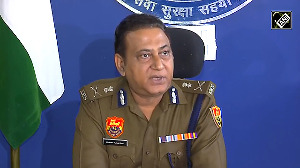No doubt, after 14 long years, the final verdict in the March 12, 1993 blasts case has been delivered, and also delivered along with it is a sense of justice in a disturbed society.
But without the trial of Mustafa 'Tiger' Memon and Dawood Ibrahim, the main accused in the case, the most important anti-terror case in independent India will always remain an unfinished chapter.
However, in a society like ours, the perception of justice being done assumes as much importance as actual justice.
Memon and Ibrahim were 'Indian Muslims' and their victim was cosmopolitan Mumbai.
Their devious planning, execution and implementation of the heinous act with the help of Pakistan's Inter-Services Intelligence killed 257 people and injured 700 people on March 12, 1993, and hit at the heart of Mumbai's liberal spirit.
Very uncomforting communal politics was attached to the case since the accused in the case were largely Muslim with a perceived sense of injustice.
Because of this, the lawyers, government machinery, jail management, prosecutors and the justice system itself were under scrutiny.
Unfortunately, the case would have been reported better and lessons better understood by Indian society had Sanjay Dutt's involvement not hijacked the public debate.
It is our loss that we didn't debate enough the fact that within Mumbai the Memons and Ibrahim could carry along more than 75 Indians to help in their 'war against India.'
The glamorous and fascinating sub-plot of Sanjay Dutt has put paid to any introspection about the broader issues of the case irrevocably; the amount of space, energy and time wasted in reporting him could have been better used in asking and debating more pertinent questions.
Enough has not been written about how a corrupt security machinery guarding the Indian borders and seas allowed the landing of weapons of mass destruction like RDX at Shekhadi and Raigad in Maharashtra.
Or how, right in the heart of Mumbai, in the north-central area of Mahim, 'Tiger' Memon nurtured venom in his heart to hit forcefully at his own city and his own neighbours at its most vulnerable point.
Or how Dawood Ibrahim, while escaping Indian law, enjoyed support and protection in the Gulf and Pakistan to make the Indian diplomatic and security establishment look silly, and how he was able to arrange and execute a plot to tear apart Mumbai.
If the debate about the involvement of local Muslims in an ISI-sponsored plot in 1993 had been raised to a high-decibel level, then we would have known the Muslim disenchantment with the Indian system better.
Because we did not, we are left to discuss the subject more than a decade later.
Things have gone wrong somewhere since then. Some members of Mumbai's Muslim community collected zakat to help the accused in the bomb blasts.
For some reasons the judgment is getting a mixed response in the closed-door debate within Mumbai's families.
It is argued that some of those who helped in the landing and planting of bombs do not fit the profile of terrorists but they have still been awarded death sentences. Yaqub Menon, who came back from Pakistan, is another story about which the public hardly knows anything. He helped the Indian security agencies know all about his absconding brother and Dawood Ibrahim; he also cooperated in the Intelligence Bureau's plan to get back seven members of his family members from Pakistan.
The judgment would have made greater sense if Dawood Ibrahim and 'Tiger' Memon were also awarded the harshest punishment along with their cronies, but their trial could not take place, making the trial look incomplete.
An increasing number of Muslims are asking about the government's lack of action on the report of the Srikrishna Commission, which investigated the December 1992-January 1993 riots in Mumbai.
The argument that the March 12, 1993 blasts was a pure act of terror with international dimensions and the other a communal riot in a time of distrust does not jell with many Muslims who feel the Indian system reacts much more slowly in dealing with their problems.
The Srikrishna Commission -- which was instituted to probe the causes of the Mumbai communal riots in which around 1,500 people were murdered, 1,829 injured and 165 went missing in December 1992-January 1993 -- submitted its report, but it has not been implemented, and the riot victims have largely been denied justice till date.
The slow action or no action on the part of successive state governments to charge the Shiv Sena leaders who are accused of engineering the Mumbai riots dilutes the impact of this glorious moment of legal history.






 © 2025
© 2025